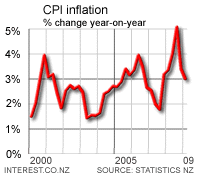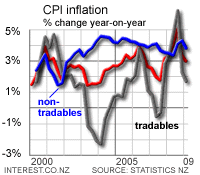 New Zealand's annual inflation rate was 3.0% in the first quarter of 2009 from the same quarter last year, Statistics New Zealand (Stats NZ) said. (Update 1 includes more on tradables and non-tradables inflation).
This was compared to an annual rate of 3.4% in the December quarter. Consumer prices rose 0.3% in the March quarter from December after a 0.5% fall in the December quarter.
The latest figures show inflation is back within the Reserve Bank's 1%-3% target range. The market consensus was for year-on-year inflation to be 3.0% and quarterly inflation to be 0.3%.
New Zealand's annual inflation rate was 3.0% in the first quarter of 2009 from the same quarter last year, Statistics New Zealand (Stats NZ) said. (Update 1 includes more on tradables and non-tradables inflation).
This was compared to an annual rate of 3.4% in the December quarter. Consumer prices rose 0.3% in the March quarter from December after a 0.5% fall in the December quarter.
The latest figures show inflation is back within the Reserve Bank's 1%-3% target range. The market consensus was for year-on-year inflation to be 3.0% and quarterly inflation to be 0.3%.
 Annual tradables inflation was 1.7% (down from 2.3% in December), while non-tradables inflation was 3.8% (from 4.3% in December).
Tradables are goods and services that are imported or that are in competition with foreign goods and services either in domestic or foreign markets, while non-tradables are goods and services that do not face foreign competition.
The non-tradables inflation figure of 3.8% still points to a domestic inflation problem in New Zealand. From the December quarter, non-tradables inflation was 0.7% and tradables inflation fell 0.4%.
Stats NZ said the main reasons for the rise in non-tradables inflation over the March quarter were higher prices for cigarettes and tobacco, up 4.3%; and education fees, up 4.2%.
Food prices rose 1.2% from December and 8.8% from March 2008. Fruit and vegetable prices fell 0.4% in the quarter, but were still up 12.2% from a year ago. Grocery food prices rose by 1.4% quarterly and 8.9% yearly, while meat and poultry prices were up 0.9% from December and 11.5% annually.
The reduced rate of increase for tradables inflation from March last year was largely due to the fall in petrol prices, Stats NZ said.
"If petrol and diesel prices had remained constant from the March 2008 quarter to the March 2009 quarter, the tradable component would have increased 2.8%, Government statistician Geoff Bascand said.
Annual tradables inflation was 1.7% (down from 2.3% in December), while non-tradables inflation was 3.8% (from 4.3% in December).
Tradables are goods and services that are imported or that are in competition with foreign goods and services either in domestic or foreign markets, while non-tradables are goods and services that do not face foreign competition.
The non-tradables inflation figure of 3.8% still points to a domestic inflation problem in New Zealand. From the December quarter, non-tradables inflation was 0.7% and tradables inflation fell 0.4%.
Stats NZ said the main reasons for the rise in non-tradables inflation over the March quarter were higher prices for cigarettes and tobacco, up 4.3%; and education fees, up 4.2%.
Food prices rose 1.2% from December and 8.8% from March 2008. Fruit and vegetable prices fell 0.4% in the quarter, but were still up 12.2% from a year ago. Grocery food prices rose by 1.4% quarterly and 8.9% yearly, while meat and poultry prices were up 0.9% from December and 11.5% annually.
The reduced rate of increase for tradables inflation from March last year was largely due to the fall in petrol prices, Stats NZ said.
"If petrol and diesel prices had remained constant from the March 2008 quarter to the March 2009 quarter, the tradable component would have increased 2.8%, Government statistician Geoff Bascand said.
NZ inflation rate falls to 3% in March quarter (update 1)
NZ inflation rate falls to 3% in March quarter (update 1)
17th Apr 09, 10:57am
by

We welcome your comments below. If you are not already registered, please register to comment
Remember we welcome robust, respectful and insightful debate. We don't welcome abusive or defamatory comments and will de-register those repeatedly making such comments. Our current comment policy is here.